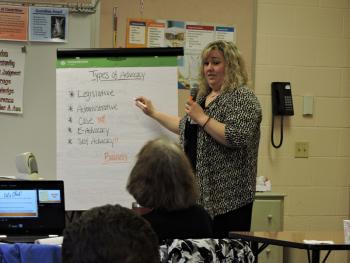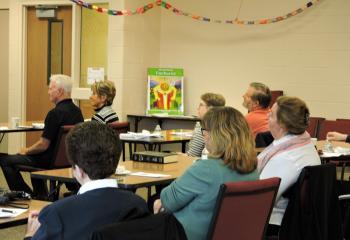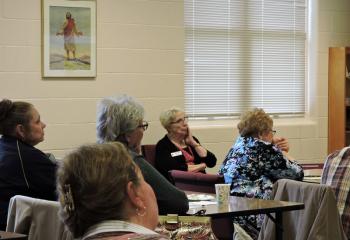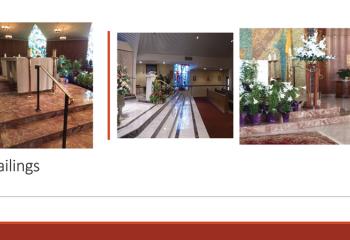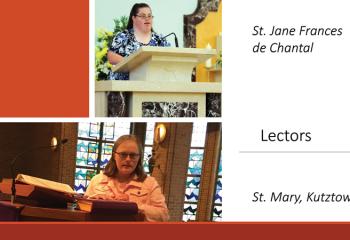By TAMI QUIGLEY Staff writer
“Empathy and compassion – that’s really what advocacy is down at its core,” said Jessica McKenty, advocacy director at The Arc of Lehigh and Northampton counties, keynote speaker of the Diocesan Ministry with Persons with Disabilities half-day conference for parish advocates April 13 at St. Mary, Kutztown.
McKenty addressed advocacy, the important skills needed to be an advocate and the specifics of advocating for people with disabilities.
The morning included McKenty’s presentation; a PowerPoint of some of the successes of parish advocates in their parishes by Sister of Mercy (RSM) Janice Marie Johnson, director of the Office of Ministry with Persons with Disabilities; and a networking session.
Sister Janice welcomed those gathered to the morning session.
McKenty said she has a passion for what she does, and shared the story of her own brother’s disability.
Noting that advocacy provides for community, McKenty said, “Advocacy doesn’t have one definition – it’s pretty broad.”
“Advocacy supports a cause, idea or a group of people. It focuses on dialogue and education. It often addresses a wide variety of issues,” McKenty said.
“When it gets specific, it’s activism.”
McKenty said activism supports one side of a particular issue and is often controversial. It focuses on direct action and usually addresses one issue. It’s usually rooted in politics and legislation, with McKenty highlighting Rosa Parks and her fight for civil rights as an example of activism.
McKenty said lobbying targets specific legislation and is done on a direct or grassroots level – the grassroots level intersects with advocacy.
“Advocacy is really the big umbrella.”
McKenty explained five types of advocacy: legislative advocacy, administrative advocacy, case advocacy, e-advocacy and self-advocacy.
“Legislative advocacy has a crossover with grassroots lobbying and focuses on dialogue and education,” McKenty said.
Administrative advocacy includes creating new policies and revising guidelines. Case advocacy is acting on behalf of a client to access needed resources and services or to influence policy change.
McKenty said e-advocacy is using social media to raise public awareness and influence a broader public debate about an issue or cause, and is used to develop calls to action among community.
“It allows citizen participation to the next level,” McKenty said, such as sending an e-blast of information or a petition, and using hashtags.
“When someone from the parish comes to talk to you, they are practicing self-advocacy,” McKenty said.
McKenty facilitated a “Let’s Chat” session during which participants chatted with a partner focusing on four points: Which form of advocacy do you feel the most comfortable with? Which form of advocacy have you practiced in your personal life? What are some barriers to effective advocacy? And share some real life stories of how you have participated in a form of advocacy or how advocating has impacted your life.
As McKenty shared helpful tips for advocates, she highlighted active listening, which is “listening to understand, not listening to listen.” It’s gathering information and hearing a personal story. “Most times people are listening to respond, not listening to understand.”
“As an advocate you want to be as open as possible to whatever the issue may be.”
McKenty also spoke of action planning, reminding advocates, “You don’t know everything. Educate yourself, analyze and prioritize.”
“It’s impossible to advocate for someone or a cause without educating yourself.”
McKenty said collaborating is also very important. “Learn your systems, community and parishes,” she said, adding it’s important to refer clients to other agencies that can help with specific needs, such as housing. It’s key to keep a good relationship with these referral partners.
“A lot of families come to Arc confused – they don’t think there’s anything out there to help them, but chances are there is,” said McKenty, who shared she sits down and figures out what she can do, then collaborates with other needed agencies, such as for housing.
“In developing and communicating your message, prioritize your information and organize it in the correct form. Be clear and concise in what you are asking for, who you are and who you represent.”
“Be objective. I don’t always agree with what a family wants, but it’s not my life,” McKenty said.
“Self-advocacy in talking about disabilities is really impactful,” she said, stressing the importance of hearing someone’s personal story.
“As our speaker indicated, ‘an advocate focuses on dialogue and educating him/herself and then moving forward in support of a person or cause.’ Some of our parish advocates have done just that,” said Sister Janice.
“Although physical changes are more visible, attitudinal changes among parishioners are also happening as a result of the efforts of parish advocates in collaboration with pastors in parishes throughout the Diocese,” Sister Janice said. “Persons with disabilities are in the ministries of lector, altar server, commentator, usher and greeter.”
“As Pope Francis said, ‘if churches are not inclusive, they should shut their doors



